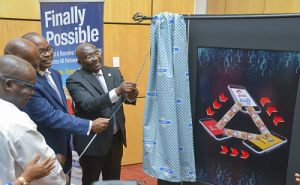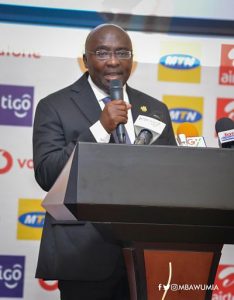The Ghana Chamber of Telecommunications together with the Government of Ghana, Central Bank, GhIPSS and commercial banks on Thursday 10th May 2018 launched the mobile money interoperability system at the Marriot hotel in Accra.
The Mobile Money Payment Interoperability is the service, which allows direct and seamless transfer of funds from one mobile money wallet to another mobile money wallet across networks, which was developed by Ghana Interbank Payment and Settlement Systems (GhIPSS) with active collaboration of the Mobile Industry.
It creates convenience for mobile money users to transact business and drives financial inclusion, lowers cost of transaction, increases service reach and reduces reliance on cash for payments. It also provides a financial transaction engine that is versatile, efficient and robust and enhances patronage by both banked and unbanked segment of the population.
Ing. Kenneth Ashigbey, CEO of the Telecoms Chamber in his speech at the event said “our customers would benefit from network effects and from reduced transaction costs. Governments can also be optimistic that interoperability can help advance financial inclusion due to the ubiquitous nature of mobile and reduced transaction costs as well as can also lower the cost of printing and managing cash.
Vice President Dr Mahamudu Bawumia, who launched the system in Accra, acknowledged the contribution and co-operation of the Bank of Ghana (BoG), GhIPSS, the telcos and financial institutions for ensuring the realization of the system.
This is the Phase One of two phases of the interoperability payments system. Under the Phase One, customers will be able to move monies freely from mobile money accounts across different networks and from their mobile money accounts to bank accounts without any hassle.
The second phase, which will be completed in the next two months, will allow the movement of monies between and among telecommunication operators, banks and e-zwitch accounts in a seamless manner –and the flow is vice versa, to complete the Financial Inclusion Triangle.
Vice President Bawumia noted that after 60 years of the country’s independence, about 60 per cent of the population did not have bank accounts, and had no access to payment instruments aside cash for transactions.
This, he said, necessitated low level of savings in the financial system and the reason for the high interest rates on loans in most developing countries like Ghana.
It was against that backdrop, he said, the Government decided to have a platform that would rope in both banked and unbanked segments of the population to improve domestic resource mobilization and reduce the interest rates on loans.
He said the mobile revolution had provided a major opportunity to cover about 70 per cent of the bankable population since there were 37 million connected to mobile phones in Ghana, which would rope-in a majority of the population into the financial space.
He noted that it was the fastest way of formalising the economy and would improve the efficiency of the country’s tax collections efforts and stem capital flight.
Vice President Bawumia said: ‘If done on a comprehensive scale, financial resources locked up in non-financial assets would be brought into the banking system for intermediation and this could be a significant source of resources (representing potentially three-two times what is being currently intermediated in financial system.’’
He described the launch as a historic day for the nation, noting that the singular achievement reinforced President Nana Addo Dankwa Akufo-Addo’s belief that with the right conditions and leadership, there was nothing Ghanaians could not achieve as a people.
The Vice President noted that a cash-lite economy would not only bring about efficiency and convenience, but would also save the nation a lot of money that was spent for maintaining the currency notes.
He urged the various public institutions to be ready to accept electronic payments to give meaning to the various efforts at introducing different electronic payment channels.
Vice President Bawumia said the government next step would be to focus on cross-border arena to ensure efficient payment system among the countries in the sub-region to promote intra-African trade.
The event attracted key stakeholders including; Dr Ernest Addison, the Governor of the Bank of Ghana, Dr Maxwell Opoku Afare, First Deputy Governor of the BoG, Mr Achie Hesse, the CEO of GhIPSS, executives of the Ghana Bankers Association, CEOs of financial institutions, CEOs of telecommunication companies and captains of industries.
Source: GNA




